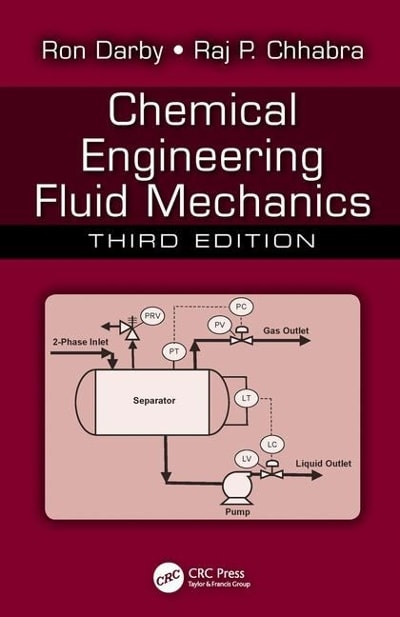The variables involved in the performance of a centrifugal pump include the fluid properties $(mu$ and $ho$
Question:
The variables involved in the performance of a centrifugal pump include the fluid properties $(\mu$ and $ho$ ), the impeller diameter $(d)$, the casing diameter $(D)$, the impeller rotational speed $(N)$, the volumetric flow rate of the fluid $(Q)$, the head $(H)$ developed by the pump $(\Delta P=ho g H)$, and the power required to drive the pump $(H P)$.
(a) Perform a dimensional analysis of this system to determine an appropriate set of dimensionless groups that would be appropriate to characterize the pump. Arrange the groups so that the fluid viscosity and the pump power each appear in only one group.
(b) You want to know what pressure a pump will develop with a liquid that has a specific gravity of 1.4 and a viscosity of $10 \mathrm{cP}$, at a flow rate of $300 \mathrm{gpm}$. The pump has an impeller with a diameter of $12 \mathrm{in}$., which is driven by a motor running at $1100 \mathrm{rpm}$. (It is known that the pump performance is independent of fluid viscosity unless the viscosity is greater than about $50 \mathrm{cP}$.) You want to run a lab test that simulates the operation of the larger field pump using a similar (scaled) pump with an impeller that has a diameter of $6 \mathrm{in}$. and a $3600 \mathrm{rpm}$ motor. Should you use the same liquid in the lab as in the field, or can you use a different liquid? Why?
(c) If you use the same liquid, what flow rate should be used in the lab to simulate the operating conditions of the field pump?
(d) If the lab pump develops a pressure of $150 \mathrm{psi}$ at the proper flow rate, what pressure will the field pump develop with the field fluid?
(e) What pressure would the field pump develop with water at a flow rate of $300 \mathrm{gpm}$ ?
Step by Step Answer:

Chemical Engineering Fluid Mechanics
ISBN: 9781498724432
3rd Edition
Authors: Ron Darby, Raj P Chhabra





